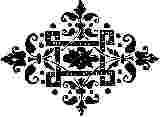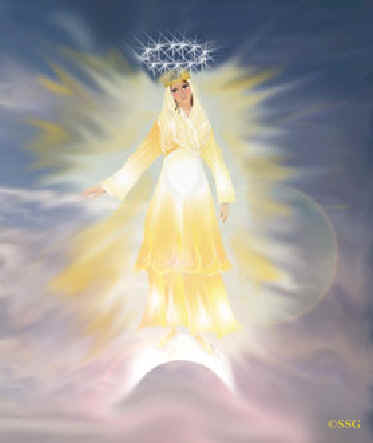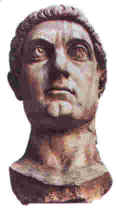The "dragon" of Revelation is a long-lived creature. The
story begins with the Roman Empire at a time when the early
Church, pictured in the
"woman," had become a vital force. Satan had successfully killed the Founder of
the Church and then was confronted with the reality of a living and vibrant body of
believers.
At times Satan tried to ignore the early Christians, hoping they would
go away. Then he tried to persecute and destroy them by vicious attacks. At last he tried
to join them and corrupt them. The latter method seemed to work best.

|
This "dragon" story covers the whole period of the Christian Church.
The "dragon" is on the scene from the earliest Roman Empire
until it is destroyed in "Armageddon."
(Revelation 16:13, 19)
Hence, the "dragon" is here until the bitter end.
Its fall will precede the full establishment of Christ’s
Kingdom, the fifth universal empire.
|

Verse
1
"And there appeared a great wonder in heaven; a woman
clothed with the sun, and the moon under her feet, and upon her head a crown of twelve
stars." |

The "Woman" is the Early Church
|
The story of this chapter actually centers around the
"woman." She is given a splendid introduction. Then there follows a great
struggle.
We do not know what happens to the "woman" of this chapter.
She fades away leaving a "remnant of her seed, which keep the commandments of God,
and have the testimony of Jesus Christ."
(Revelation 12:17)
The "dragon’s" distress is exacerbated by the fact that
the "woman" leaves such a marvelous legacy. I hope we each are a part of it. She
also gives birth to a "man child," whom the "dragon" is extravagantly
interested in as his kind of child.
This phenomenon is seen in the spiritual realm, which is actually
the "heavens of earth," or a part of the religious ruling power.
The
"woman" is described as "clothed with the sun" or the Gospel light.
She is not related to the "whore" of Revelation
in the seventeenth
chapter. She is not dressed with the regal clothing bestowed by paramours, but with the
purity of the Gospel sunlight provided by Christ.
The "moon" typifies the Jewish Law that the early
Church had
under "her feet." The righteousness of that law is "fulfilled in us, who
walk not after the flesh, but after the spirit."
(Romans 8:4)
To compliment her beautiful attire, she is said to wear a "crown
of twelve stars." (Revelation 12:1) Just as
the "seven stars" of Revelation typify the "angels [messengers] of the
seven churches," so the "twelve stars" represent the "twelve apostles of
the Lamb." (Revelation 21:14)
This language describes very accurately the early Christian church. It
has been difficult in any period of Church history to find an absolutely pure
Church.
"Wheat" and "Tares" would be together until the "Harvest."
We must not think of this "woman" as being composed of all saints. If any body
of Christians were ever all saints, it would be rare indeed.
How could such a nice "woman" be with
"child"?
The "woman" of our lesson has the misfortune of giving birth
to Satan’s "man of sin" child. Was she unfaithful because she was found
with this man-child?
We believe not. Just as the "devil" sowed "tare"
seed in the Lord’s field, so the devil succeeded in planting his "seed" in
the early Church. Paul said, "The mystery of iniquity doth already work."
(2 Thessalonians 2:7)
It was easy to plant ambition, the desire for lofty positions, greed
and the desire for power and riches. Who planted sin in Satan? It arose from his lust and
desire.
The only difference between the devil and this child, the
"man-child" of sin, is that the devil had fostered this evil spirit within the
early Church, whereas sin originated within the devil’s heart. The devil has always
had a "seed" ever since the Garden of Eden.
|
In
Genesis 3:15 God told the serpent: "I will put enmity between thee and the woman, and
between thy seed and her seed."
This enmity has continued throughout history.
The "devil’s seed" will be on the scene until the devil
is loosed out of his prison and goes forth to "deceive the nations."
(Revelation 20:7-10)
|
 |
Jesus said of Satan’s seed in his time: "Ye are of your
father the devil, and the lusts of your father ye will do" (John 8:44). Satan will
have his deceived children to represent him until they are all destroyed at the end of the
Millennium. (Revelation 20:9)

Is This Woman Representative
of the Sarah Covenant?
Some have felt that the Sarah Covenant pictures this
"woman." This view would have merit only if the "man child"
represented Christ. Such does not seem to be the case.
|

The "Manchild" represents
the Apostate element
in the Early Church
—Not Jesus. |
While the "dragon," represented in Herod, did try to kill the "child"
Jesus, he did not succeed. Jesus fled into "Egypt," not to heaven. There was no
throne for Jesus while he dwelt on earth.
While Jesus finally is raised to heavenly glory, it was not as a
"man child." He was raised a "life-giving spirit." (1 Peter 3:18)
Jesus did not gain heavenly glory by beating the devil in combat.
|
He said, "All power is given unto me in heaven
and in earth." (Matthew 28:18) God the Father gave it to Jesus. There was no way that
the devil and Jesus were locked in conflict for heavenly glory.
Why would the "crown of twelve stars" be featured on this
woman before the "man child" is born?
Jesus selected the twelve apostles when he was a grown man and not a
"child." To teach that the "twelve apostles" crowned the woman who
gave birth to Jesus seems almost irreverent.
While Jesus was put to death on the cross, it was not as a
"child." The devil was successful in securing Jesus' death. He remained in the
grave for parts of three days and was not snatched up to heaven. He stayed on earth for
forty more days before he ascended to heaven. None of this fits the scenario given in
Revelation 12.

|
Verse
2
"And she being with child cried, travailing in birth, and
pained to be delivered." |
While the "Wheat" and "Tares" are allowed to grow
together until the Harvest, such was not the case with this "man child." It was
to have an early separation or birth.
You cannot have faithful and unfaithful leadership together for too
long. Divisions have to come when righteousness and truth will not permit the faithful any
other recourse.
We notice that this "woman" does not nurse or care for this
child. There is no affinity here. Normally, a woman would have a caring and loving
disposition toward her child. There is none shown here. Here we see the "man
child" is provided for lavishly without its mother. There is no love between this
"woman" and her "child."
|

Emperor Constantine
became Pontifex Maximus
the Chief Religious Ruler
of the Church of Rome |
This "woman" is "pained to be delivered." She obviously had this
element within the confines of the Church that pained and troubled her.
The catalyst for giving
"birth" came in Constantine’s time, when he entered the
Church as Pontifex
Maximus or Chief Religious Ruler. |